Back in 2012, the tiny town of Perdasdefogu in Sardinia, Italy made global headlines after a Guinness World Record was given to the town’s Melis family who at the time had a combined age of 818 years.
The nine siblings were then known as the world’s longest-lived family, with the surviving siblings going on to feature in Dan Buettner’s 2023 Netflix documentary Live to 100: Secrets of the Blue Zones.
So what is a blue zone, and why do some residents live so much longer?
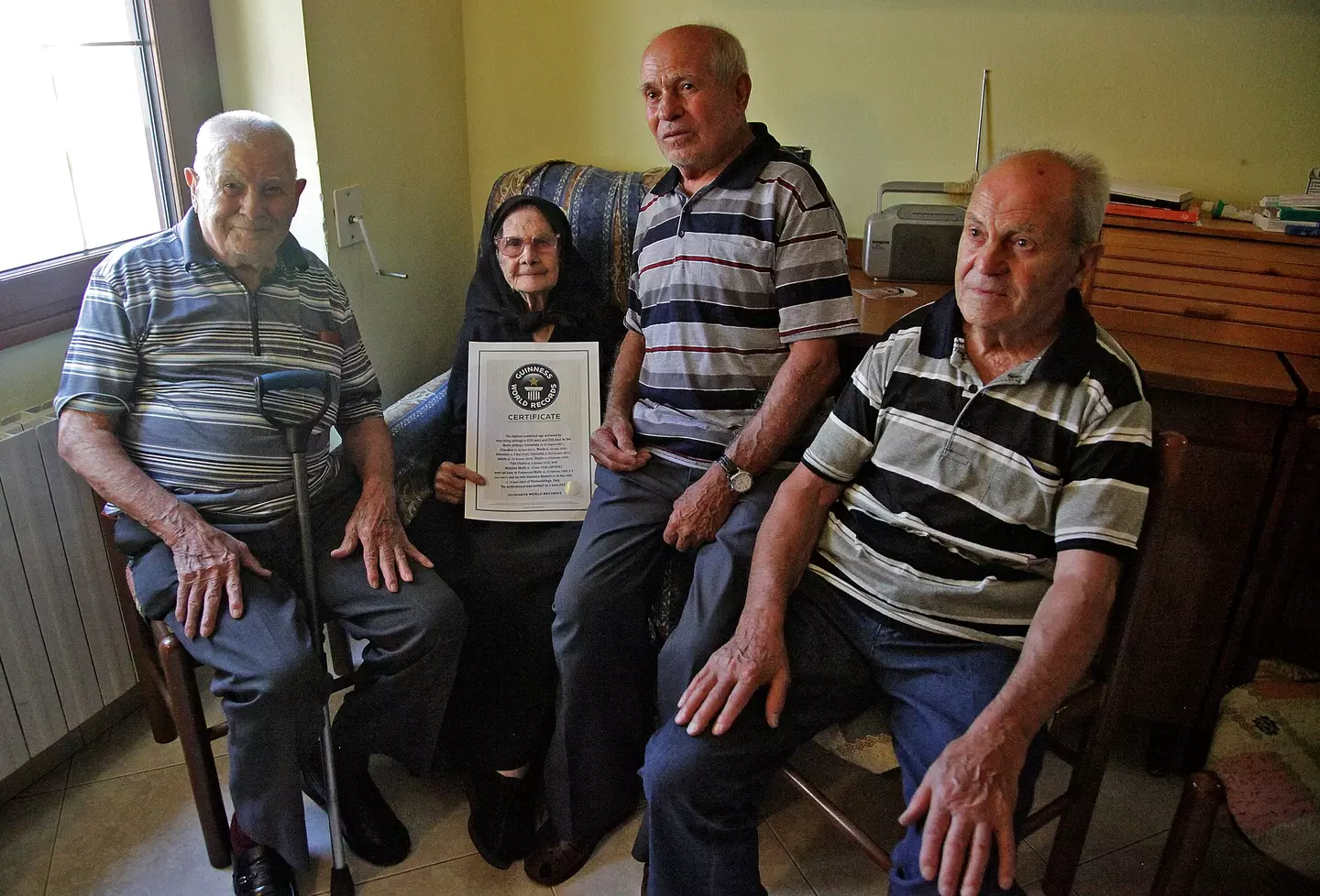
The Melis family received a honour of the oldest living in family (ETTORE LOI/AFP/GettyImages)
The world’s blue zones, explained
According to various studies, across the past couple of decades there are currently five blue zones spread around the planet, these are: Loma Linda in California, Nicoya in Costa Rica, Okinawa in Japan as well as the islands of Sardinia and Icaria in Italy and Greece respectively.
So what makes these places so special?
Ever since Buettner coined the phrase back in 2005, there has been a global fascination over what makes these particular places so special when it comes to people living longer and healthier lives.
And it turns out there are a number of factors involving diet and lifestyle which makes these places particularly special. “The key factor across all the blue zones is that the centenarians living there did not wake up one morning and decide they wanted to live to 100,” Buettner explained in a previous interview with The National.
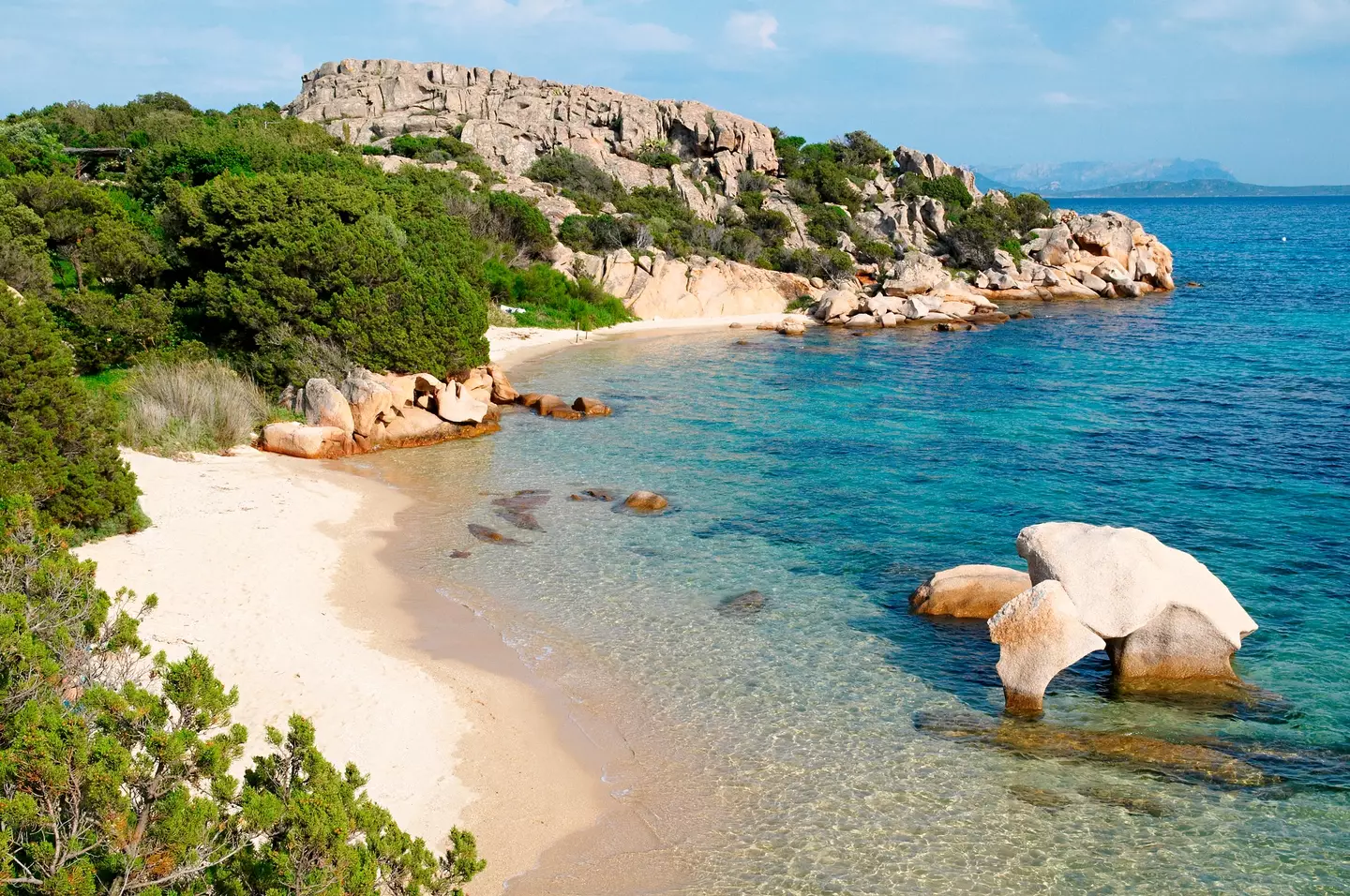
Sardinia is considered one of the planet’s five ‘blue zones’ (Getty Stock Images)
“They simply lived in environments that nudged them into daily movement, encouraged social connectedness and plant-based eating – making the healthy choice not only easy, but unavoidable.”
He continued: “We found that all the blue zones shared nine common characteristics that we feel create this environment of health.”
For example, the Melis family revealed that a daily staple in their diet included a three bean minestrone soup, which included a number of additional vegetables and is packed full of nutrients, fibre and protein.
Moderate amounts of alcohol are also common in these diets, as well as a more relaxed outlook on life and stronger sense of community. Buettner states that ‘knowing your sense of purpose’ can also be a crucial part of living longer as well.

Minestrone soup was a staple in the Melis family diets (Getty Stock Images)
Environment can also play a crucial role, with Giacomo Mameli – a distant cousin of the Melis siblings – telling The Guardian in 2021: “We live in a place where the air is clean. Our centenarians were in continuous movement in a healthy environment.
“Another important factor is that Perdasdefogu conserves the sense of community… if you talk, you live well.”
Featured Image Credit: (ETTORE LOI/AFP/GettyImages)
Topics: Community, Health, Lifestyle, Food And Drink, World News
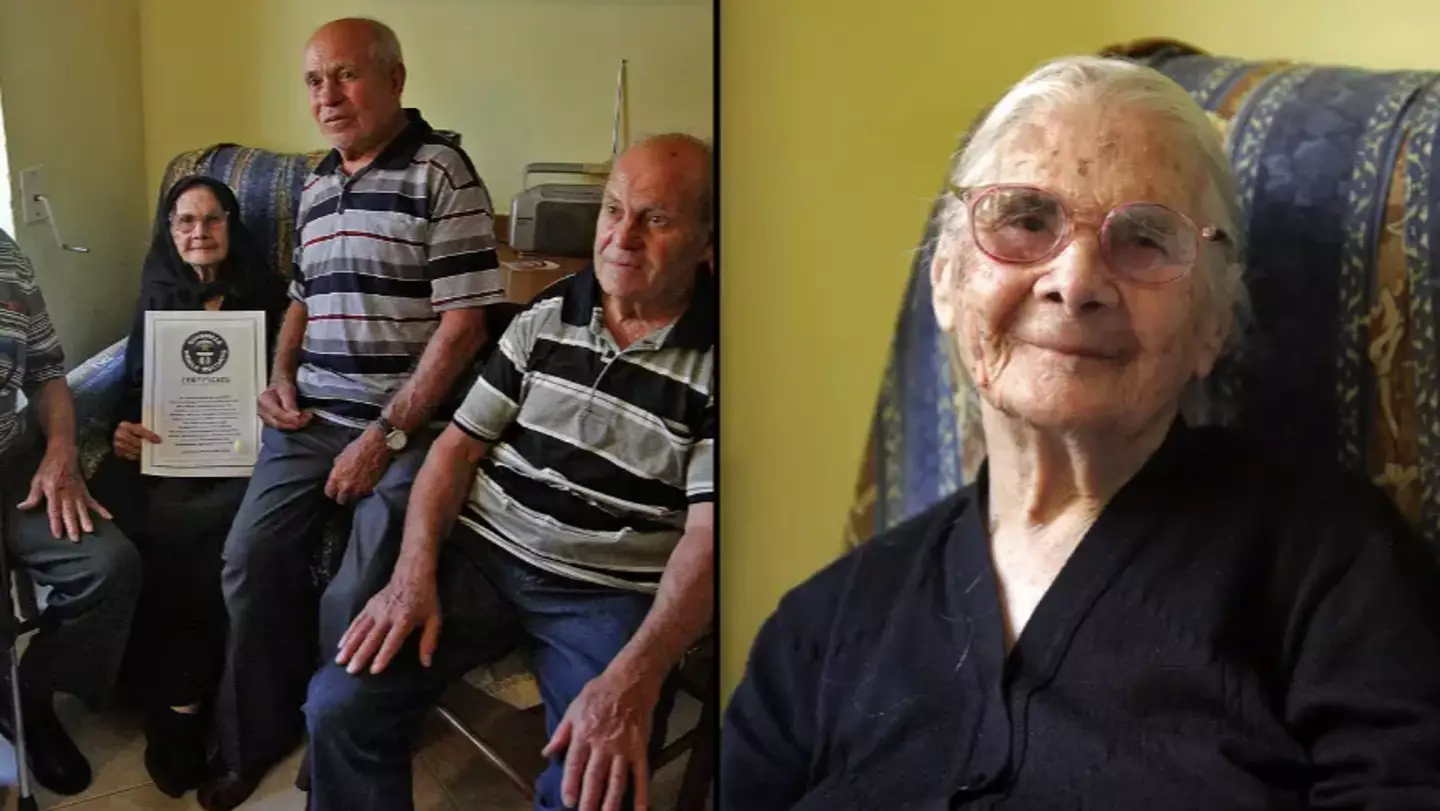
The oldest family in the world ate the same meal for their entire life and even experts swear by it.
Forget eating out at new restaurants, whipping up crazy recipes or trying to expand your palette, the Melis family from Italy apparently found the secret to a long and healthy life – and it’s all down to this one meal.
Who are the Melis family?
The nine siblings were known as the world’s longest-lived family, and in 2012 they were given the Guinness World Record for the highest combined age of 818 years.
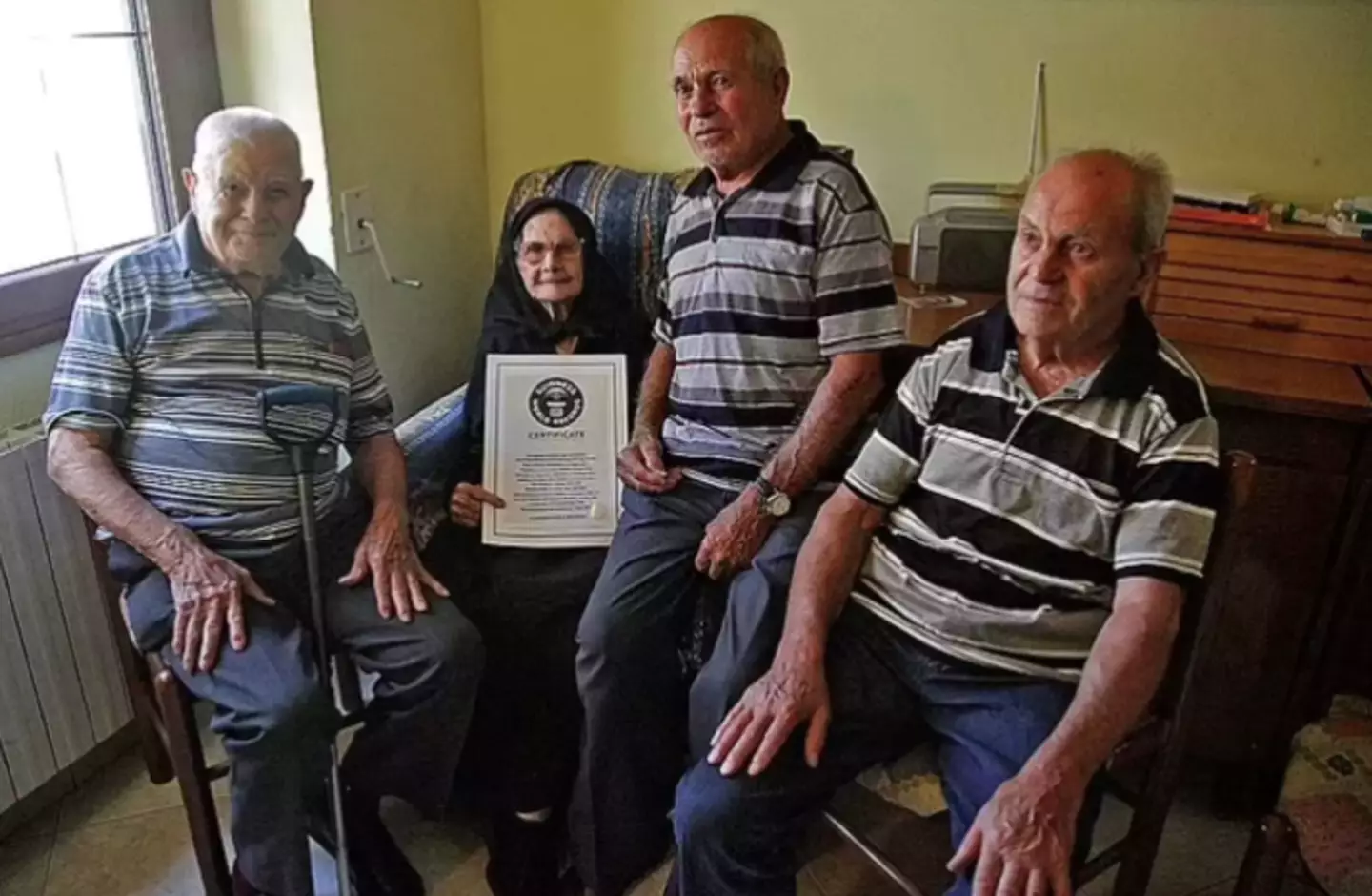
The Melis family received widespread attention in 2012 (AFP/Getty)
In 2023, the Melis siblings featured in the Netflix documentary series Live to 100: Secrets of the Blue Zones.
The show followed American author Dan Buettner visit five ‘blue zone’ areas of the world, which included Sardinia in Italy, where the Melis family lived.
A blue zone is an area of the world where people are claimed to live longer than average and Sardinia is one of the most well-known.
Buettner, an expert in tips to extend your life through healthy means, shone a light on the Melis family lunch that they ate every day.
What’s the meal?
So what’s the meal the Melis family munched on each day? You may want to reconsider your lunchtime options.
It is plant-based and contains foods full of vitamins. Explaining the meal, Buettner said: “Every day of their life they had the same meal for their lunch.
“A sourdough bread, a three bean minestrone soup – a chunky minestrone with garden vegetables.
“It always had three beans; a garbanzo, a pinto and a white bean.
“And then they had a small glass of red wine. I’m talking a two to three ounce glass.
“Now this wasn’t because ‘my diet requires me to do it’.
“No, they loved it.”
Samantha Cassetty Cassetty, a New York City dietitian, told Today.com: “People who live the longest, healthiest lives tend to eat half a cup to a cup of beans daily.
“It’s also noteworthy that the soup uses three types of beans and multiple vegetables.
“Research suggests that eating 30 unique plant foods per week can improve your gut diversity, a marker of a healthy gut.
“Your gut regulates health functions, like blood pressure and cholesterol, inflammation, mood, weight and nutrient absorption, so you’ll be more likely to live a longer and healthier life if you have a healthy gut.”

This is why the soup is so good for you (Westend61/Getty)
Why was the Melis soup recipe so healthy?
The pinto beans are packed full of nutrients, protein and fibre with zero cholesterol to be seen. Garbanzo beans are the same.
White beans are known as a ‘nutrional powerhouse’ according to Healthline, as they’re packed with fibre and protein and are a good source of micronutrients including folate, magnesium, and vitamin B6.
Where are the Melis family now?
In more recent years, members of the Melis family have passed away. Consolata Melis died in 2015 aged 108 and was her town’s longest-surviving citizen, The Guardian reported in 2021. She was the eldest in the family of nine. Her sister, Claudina, died in 2016 aged 103, and Maria died at 100 and Antonio died aged 97.
Featured Image Credit: ETTORE LOI/AFP/Getty Images/ETTORE LOI/AFP/Getty Images
Topics: Food And Drink, Health, World News, Community
.png)
Here is what your day-to-day life would look like if you lived in the ‘world’s thinnest house’.
Thanks to the increasing demand to live in cities – coupled with a crushing rise in the cost of living – many of us are having to get used to making concessions when it comes to our living situations, whether this be converting a downstairs room into a bedroom or forfeiting the luxury of a garden.
But have you ever wondered what it would be like to live in a house which is just 3ft wide at its slimmest point?

Can you spot the house in this picture? (Omar Marques/Anadolu Agency/Getty Images)
The history of the ‘world’s thinnest house’
Located in the Polish capital of Warsaw, Keret House has earned the title of the ‘skinniest free-standing’ house, even earning a spot in the Guinness World Records.
Measuring at 152 centimetres (4.99 ft) at its widest point, the building is a brilliant (or dystopian) use of available urban space by architect Jakub Szczesny and intended to be a place for travelling creatives to rest their heads, rather than be anybody’s permanent abode.
The house is named after writer Etgar Keret, who was involved in the house’s creation and went on to be the first person to stay there. Keret would later refer to the dwelling as a ‘memorial to my family’ as members from both of his parents’ families were killed during the Holocaust.
Spread over three floors, the house features a single bed squeezed under a window, as well as a kitchen, bathroom and tiny dining area, as well as a ‘living area’ which is comprised of a single beanbag. The house is raised off the ground, with the entrance being a ladder up to the first floor.
Cosy or claustrophobic? You decide.
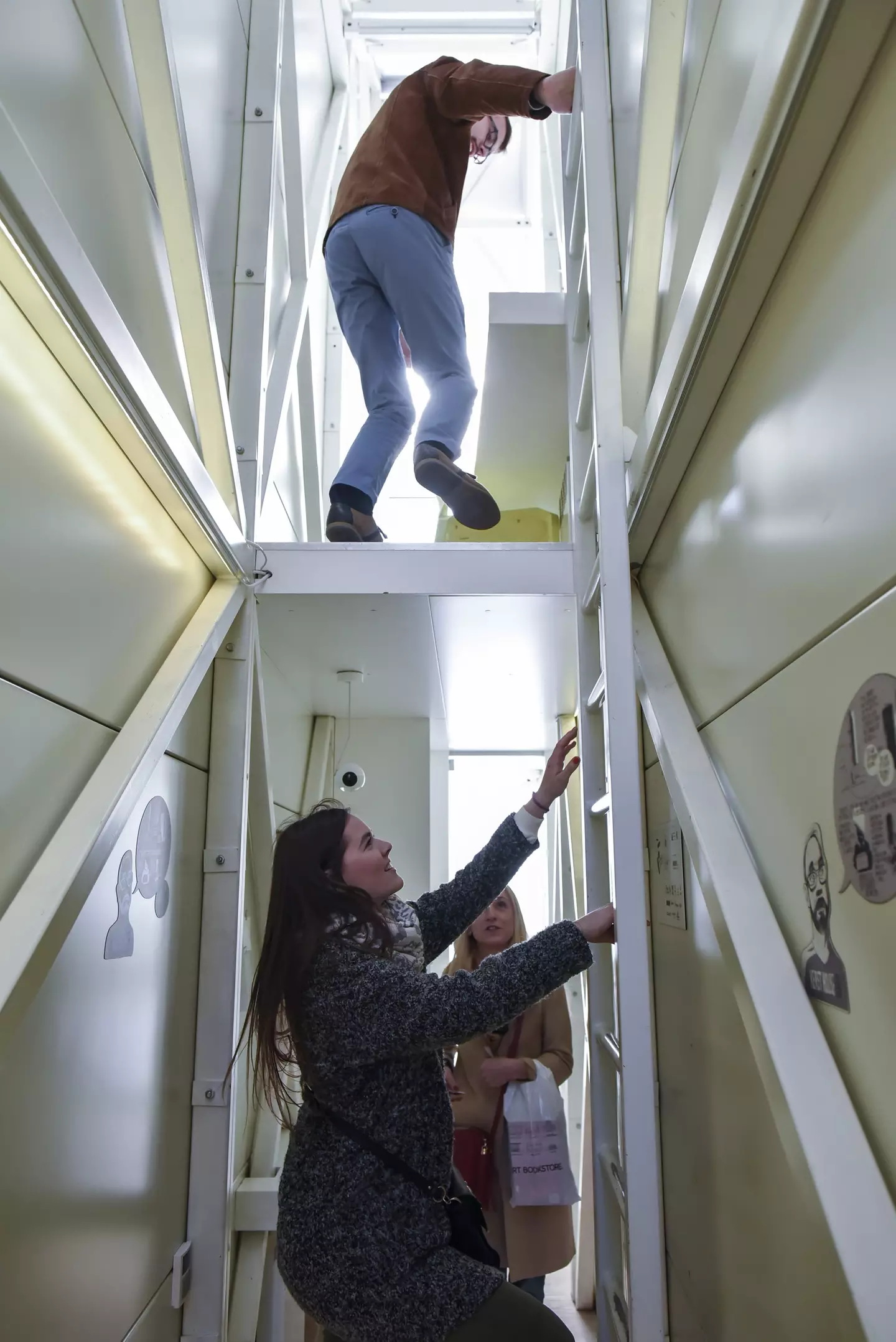
Keret House was designated as an art installation to get around local building codes (Omar Marques/Anadolu Agency/Getty Images)

Cosy or claustrophobic? (Omar Marques/Anadolu Agency/Getty Images)
Keret house is so tiny that Szczesny officially registered the place as an ‘art installation’ in order to get around building codes in the city. Which likely means that no one can live there for an extended period of time.
Reflecting on how the house came to be during an interview with Dezeen back in 2012, Szczesny explained that he conceived the idea after seeing the gap between the two buildings and wondering ‘who could live there’.
“It started with the space,” Szczesny explained.
“I started to think who could live there,” he continued. “It had to be a person that would like to be a hermit, someone who would like to spend time alone doing something, but doing what?”
However anyone looking to visit the house in person or even stay the night should prepare to be disappointed as it doesn’t appear to be open to the pubic at the moment.
Featured Image Credit: Omar Marques/Anadolu Agency/Getty Images
Topics: Lifestyle, Community, Weird, World News
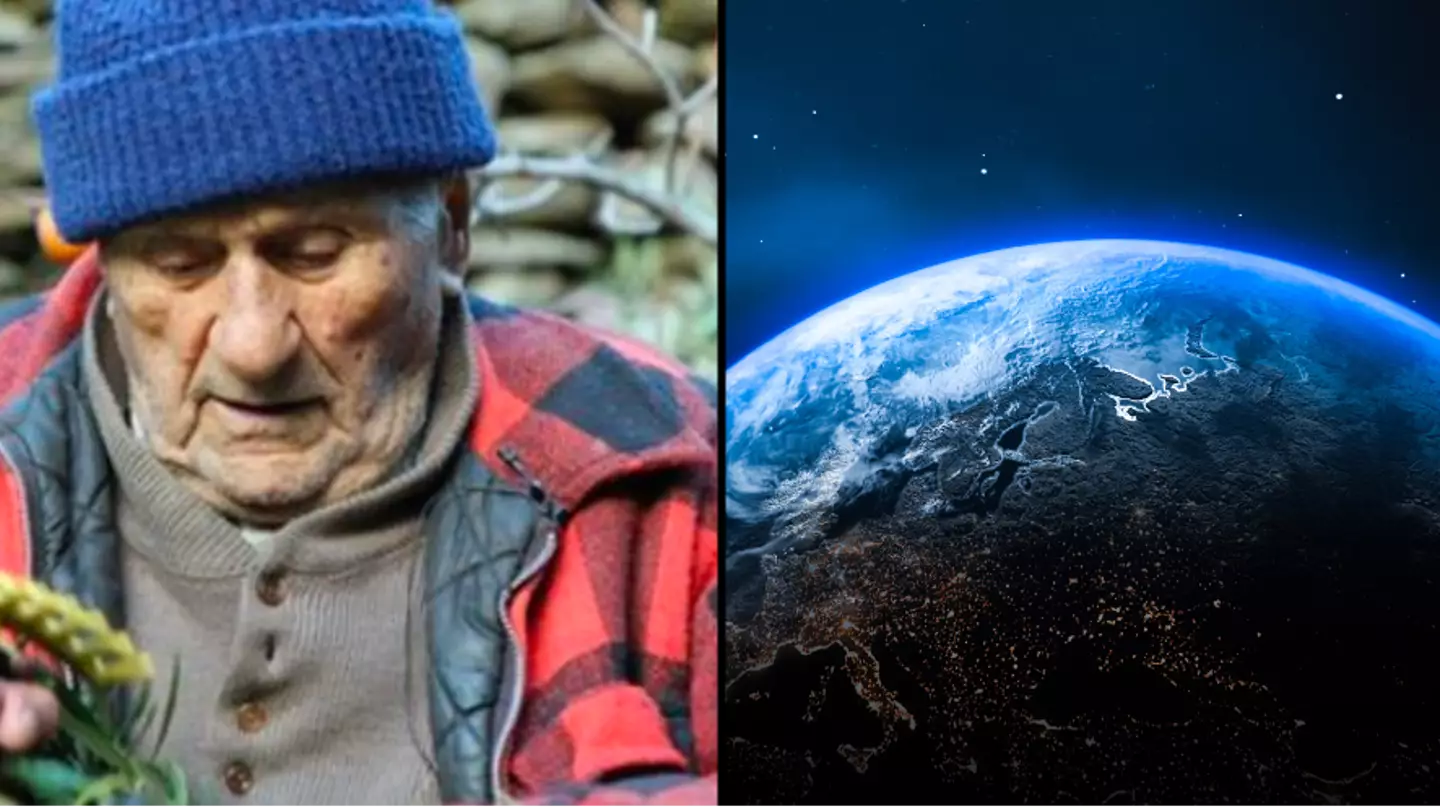
If you want to live a long and happy life then you’ll either have to eat healthily or be one of those people who inexplicably makes it to 112 years old after having nothing but whiskey, steak and cigarettes.
There are all sorts of diets which say they’re the key to good health but the people who on average live longest in the world eat the ‘Blue Zone’ diet.
First things first, you’re probably wondering what this Blue Zone is and it’s five places in the world where people who live there reach incredibly old ages.
The five Blue Zones in the world are the Japanese island of Okinawa, Italy’s Nuoro Province, Icaria in Greece, Costa Rica’s Nicoya Peninsula and Loma Linda in California.
If you live in one of these places the chances of you having ‘a good innings’ as they say is pretty high.
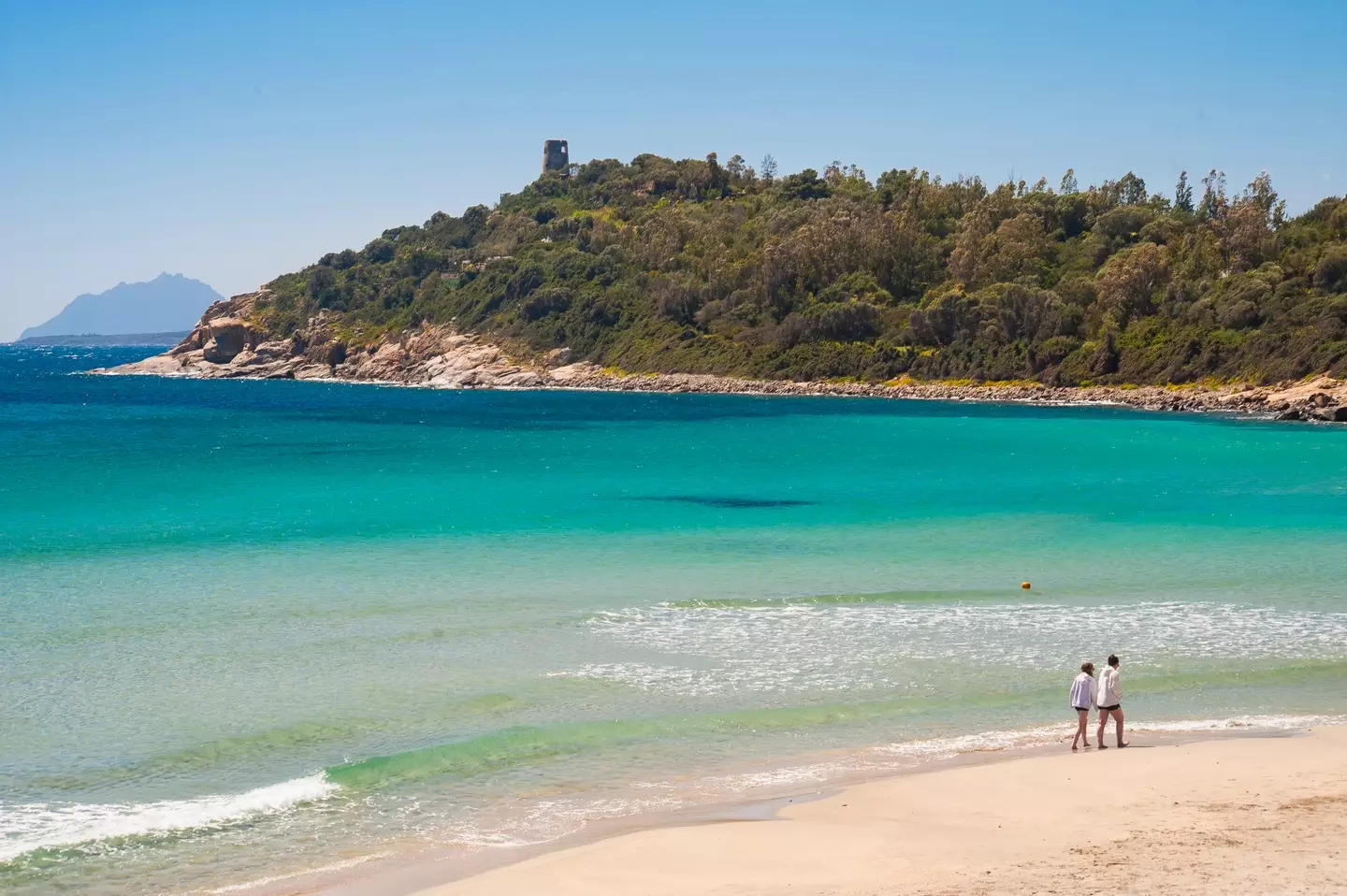
Enrico Spanu/REDA&CO/Universal Images Group via Getty Images
In these parts of the world people often live to be over 100 years old and have lower levels of cancer, heart disease, obesity and diabetes.
One of the things these places have in common were largely plant-based diets of leafy greens, while people living there also lived more active lifestyles.
We’re not talking about everyone there being a gym-nut, instead it’s more that people living in those parts of the world have to remain physically active to a decent extent.
The family unit also tends to be close-knit in these places and people have a positive outlook on life, which can add years to the lifespan.
As for what the Blue Zone diet consists of it’s mostly wholegrains, a daily portion of beans, fruits, vegetables and a couple of handfuls of nuts per day.

Mehmet Emin Menguarslan/Anadolu Agency via Getty Images
According to BBC Good Food, if you want to try this diet then you’d best develop a taste for leafy greens, root vegetables and fresh fruit.
If you’re going for meat then it should be no more than twice a week, and shouldn’t be more than 90g per piece to keep portion sizes small.
Seafood can be eaten more than meat, but you should aim for oily fish such as sardines and anchovies to bolster your meals.
Dairy products should be sheep and goat’s milk instead of from cows, and you’ll need to dodge products with added sugar.
As for drinks, a glass or two of wine per day with friends is recommended while hot drinks like coffee and tea are also a good shout.
What you’ll really need to avoid is processed foods, loads of red meat and vast quantities of sugar if you want to give yourself the best chance at living a long life.
Featured Image Credit: BBC/Getty Stock Image
Topics: Food And Drink, Health, World News

The world’s oldest conjoined twins spoke about the reason they never wanted to be separated, prior to passing away earlier this year.
Medical professionals doubted that they would survive the year, but the twins went on to live very full lives for 62 years after doctors said that they wouldn’t even make it past 30.
Defying all expectations, Lori Schappell and transgender twin George were born in 1961, with their skulls and left side of their foreheads fused together in Reading, Pennsylvania, US.
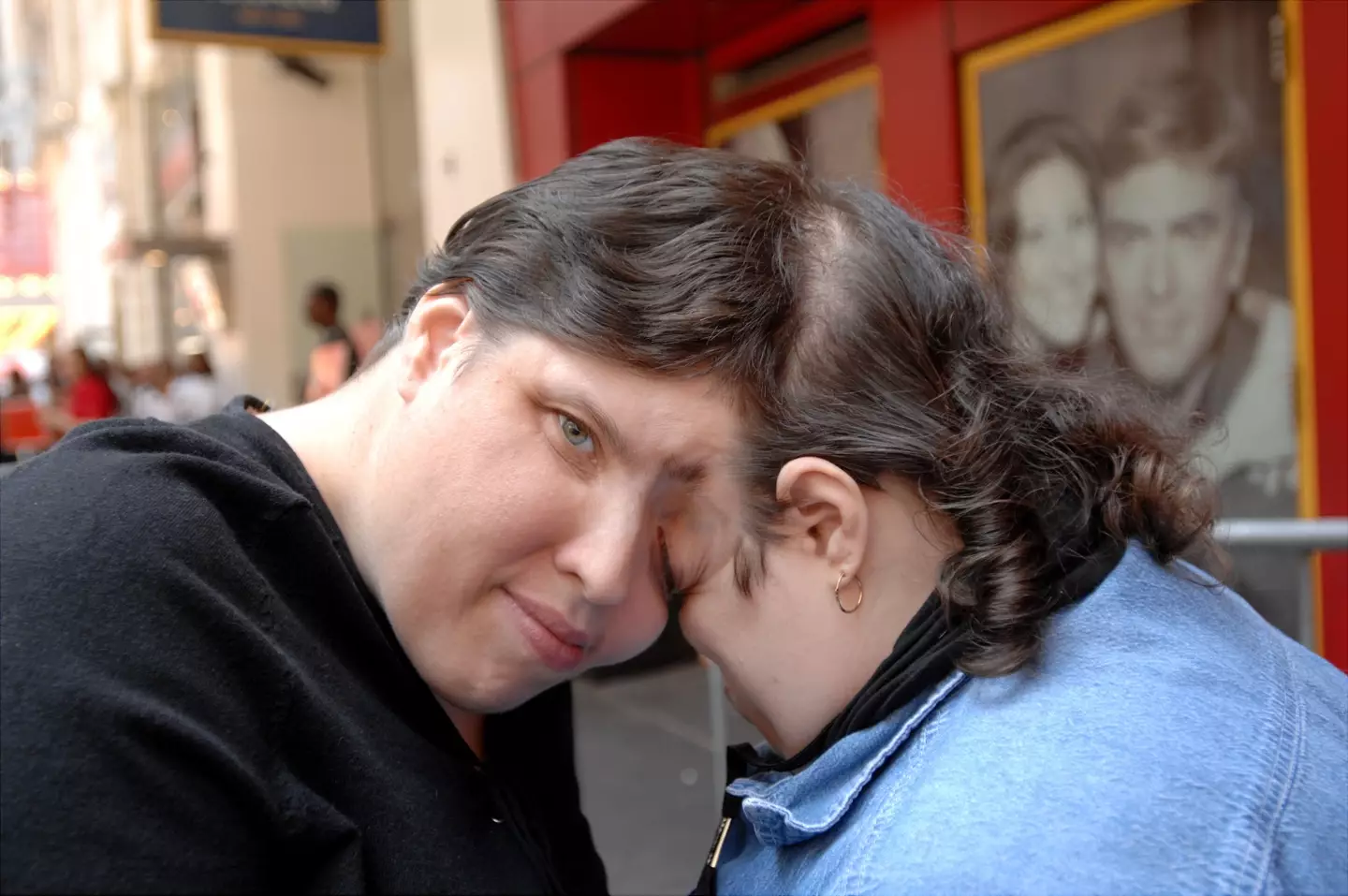
Lori and George Schappell were conjoined their whole lives. (Susan Watts/NY Daily News Archive via Getty Images)
Medical science wasn’t advanced enough at the time of their birth to separate the craniopagus twins, but even when it became possible, as their brains weren’t fused, the twins were set of staying together for one particular reason.
Lori and George are drastically different to each other, leading independent and fulfilling lives.
George, who was originally called Dori, was born with spina bifida, which is when your spine doesn’t form properly as a baby, leaving a gap in the spine and potentially causing lower limb paralysis.
He was pushed in a wheelchair by Lori, and also began identifying as a man aged 46, while also becoming an award-winning country singer.
Lori had many boyfriends in her time, putting her time into ten pin bowling, winning numerous trophies as well.
But none of this stopped the twins from compromising for each other so they could both be happy, as George went on to pursue a further education as Lori wanted to work at a hospital laundry, where they both allowed each other to pursue their dreams, with George sitting quietly on a stool while Lori worked, for example.
In the 1990s, Lori quit that job so George could chase his dreams of being a country singer, taking on the stage name Reba, performing in the US, Japan and Germany to name a few.
When George sang songs such as the Fear of Being Alone on stage, Lori would sit next to him in silence, hidden under a blanket to avoid taking the spotlight away.
He was awarded best new country artist at the Los Angeles Music Awards in 1997 for his efforts.

They chose to stay together forever. (Jason Kempin/FilmMagic/Getty)
But why did they choose to stay together?
Lori previous told the Los Angeles Times: “I don’t believe in separation. I think you’re messing with God’s work.”
Her twin added: “Would we be separated? Absolutely not. My theory is: why fix what is not broken?”
Despite this, they value their own space by having their own bedrooms, curtains in the shower and bathroom times, the twins have always made it work, as during alone time, the other would stay quiet.
Lori explained: “Just because we cannot get up and walk away from each other doesn’t mean that we cannot have solitude from other people or ourselves,
“People who are conjoined can have a very private life.”
They went through hardships together as kids, getting put into a facility for the mentally impaired in the nearby town of Hamburg, against their parents’ wishes.
Lori explained to the BBC previously that it was a court ruling that sent them away, not their parents as the whole ordeal was ‘unfair’.

They initially embraced the spotlight, but took a step back soon after. (BBC)
They became comfortable with the situation, getting used to stares from strangers and eventually got a bit of fame, having been featured on shows with Howard Stern, Maury Povish and Jerry Springer.
The twins also starred in the grand opening of Ripley’s Believe It Or Not in the iconic Times Square in New York.
Lori explained that they wanted to show that conjoined twins aren’t different to others, so took the publicity as a good thing.
However, an onslaught of questions about their sex life drew the line, with Lori and George choosing to step away from the spotlight for good, after feeling ‘exploited’ and feeling like the ‘modern version of a travelling sideshow’.
Lori has previously highlighted her wishes to have a family of her own, and George later said that he would be a ‘brother-in-law to me, that’s it.’
“They can do whatever they do and I’d act like I’m not even there. I would block it out,” he claimed.
Unfortunately, her fiance died in a traffic collision according to The Philadelphia Inquirer.
In 2015, they overtook Masha and Dasha Krivoshlyapova, who died aged 53, as the world’s oldest conjoined twins.
Sadly, Lori and George passed away at a hospital in Pennsylvania due to undisclosed causes, on 7 April 2024, aged 62.




